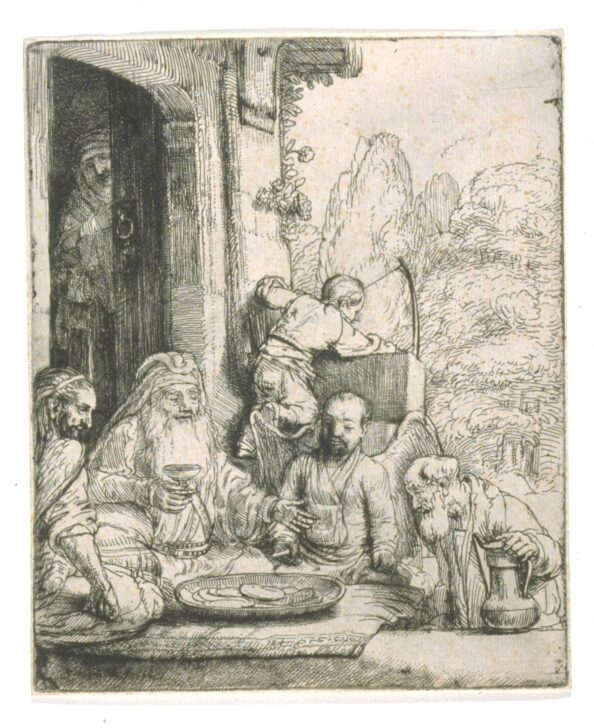Abraham Entertaining the Angels
Rembrandt van Rijn

Description
This image concerns the revelation to Abraham and Sarah that they are to have a son--a moment prior to that shown in Rembrandt's earlier print of Abraham banishing Hagar and Ishmael. Here the patriarch, in an humble pose, offers hospitality to three travelers. Only as the men eat together is their identity as angels revealed. Rembrandt diverges from the tradition of showing all three angels alike by making them of different ages and giving only two of them wings. The artist signals Abraham's dawning knowledge through his look of new awareness as the eldest angel, a godlike figure amid this trinity, naturally yet ritualistically extends one hand to him while he raises a cup with the other. The visitor's gestures allude to the Eucharist, which this meal prefigures. Rembrandt thus subtly inserts the holy into a prosaic context. Almost hidden in the darkness inside the cottage, Sarah listens, her hand drawn to her bosom indicating her surprise. Poignantly, Ishmael plays with a bow, an allusion to his later role as an archer after he is banished to the wilderness.
The composition is much simpler than the earlier image of Abraham casting out Hagar and Ishmael. Substituting a cottage for the tent in the story enables Rembrandt to exploit architectonic effects. He aligns the building and the porch with the borders of the image and arranges the figures to harmonize with the verticals and horizontals. Drawn with broader strokes, the figures are more blocklike. The three visitors are based on his drawing of a Moghul, or northeastern Indian, miniature showing men supping on the ground, lending a note of exoticism. The pose of Ishmael, seen from the back, is derived from a cupid in a fresco by Raphael. Rembrandt's seamless integration of motifs from such diverse sources is masterly.
Exhibition label text by Dr. Annette Dixon for "Bold Strokes: The Inventiveness of Rembrandt's Late Prints," February 24 - April 28, 1996.
Usage Rights:
If you are interested in using an image for a publication, please visit https://umma.umich.edu/request-image/ for more information and to fill out the online Image Rights and Reproductions Request Form.